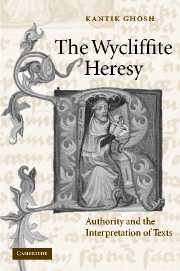Book contents
- Frontmatter
- Contents
- Acknowledgements
- List of abbreviations
- Introduction
- 1 John Wyclif and the truth of sacred scripture
- 2 William Woodford's anti-Wycliffite hermeneutics
- 3 Vernacular translations of the Bible and ‘authority’
- 4 The English Wycliffite sermons: ‘thinking in alternatives’?
- 5 Nicholas Love and the Lollards
- 6 Thomas Netter and John Wyclif: hermeneutic confrères?
- Afterword: Lollardy and late-medieval intellectuality
- Notes
- Bibliography
- Index of names and titles
- General index
- CAMBRIDGE STUDIES IN MEDIEVAL LITERATURE
5 - Nicholas Love and the Lollards
Published online by Cambridge University Press: 22 September 2009
- Frontmatter
- Contents
- Acknowledgements
- List of abbreviations
- Introduction
- 1 John Wyclif and the truth of sacred scripture
- 2 William Woodford's anti-Wycliffite hermeneutics
- 3 Vernacular translations of the Bible and ‘authority’
- 4 The English Wycliffite sermons: ‘thinking in alternatives’?
- 5 Nicholas Love and the Lollards
- 6 Thomas Netter and John Wyclif: hermeneutic confrères?
- Afterword: Lollardy and late-medieval intellectuality
- Notes
- Bibliography
- Index of names and titles
- General index
- CAMBRIDGE STUDIES IN MEDIEVAL LITERATURE
Summary
The Mirror of the Blessed Life of Jesus Christ was one of the most popular of late medieval devotional and meditative texts. Written in the early fifteenth century by Nicholas Love, prior of Mount Grace Charterhouse in Yorkshire, the work is extant in forty-nine complete or near-complete manuscripts and is found in the form of fragments and extracts in another twelve. It therefore forms, along with the Wycliffite Bible, the Brut Chronicle and Walter Hilton's Scale of Perfection, one of the most widely disseminated works in Middle English prose. The Mirror was a free translation into the vernacular of a Franciscan text generally ascribed to St. Bonaventura in the Middle Ages, the Meditationes Vitae Christi. The Meditationes itself was one of the most protean and popular of Franciscan devotional works, extant in hundreds of Latin manuscripts and translated over the Middle Ages into almost every major European tongue. In English, there were already partial translations extant before Love's version appeared: the prose free translation known as The Privity of the Passion; the rhymed-couplet translation ascribed to Robert Mannyng; a third translation of the Passion section extant in eight manuscripts; and four other partial translations.
Nicholas Love's translation was, however, endowed with a specially privileged status. It was licensed by Archbishop Thomas Arundel in 1410 as an official alternative to the Lollard Bible, the use of which had been severely restricted. Moreover, his certificate of approval is found attached to nineteen copies of the text.
- Type
- Chapter
- Information
- The Wycliffite HeresyAuthority and the Interpretation of Texts, pp. 147 - 173Publisher: Cambridge University PressPrint publication year: 2001



